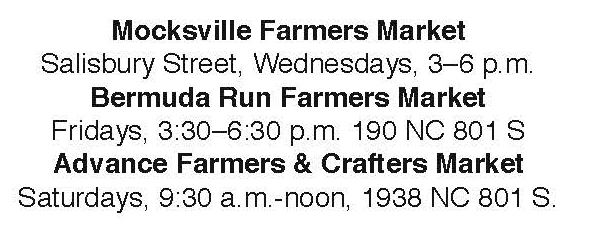Make the best of those farmer’s market dollars
Published 10:39 am Tuesday, June 3, 2025
|
Getting your Trinity Audio player ready...
|
With summer coming up, it’s the perfect time to take advantage of the farmer market season.
If you’re looking to manage your budget this summer, consider these tips and tricks for your next trip to the farmers market. Using a few tricks can go a long way in reducing overall costs.
First, it’s important to distinguish between wants and needs. A need is something we must have; a want is something we would like to have. Working within a budget includes prioritizing needs over wants, but it doesn’t mean we can never have wants. When you set a budget, set aside money to save for a want. Tracking all purchases, income sources, and benefits will help in creating an accurate budget.
Your budget includes other categories, such as gas, food, rent, and amenities. Subcategories of food spending include going out to eat, fast food, school meals, and convenience store food. Budgeting is a tight and rigid process, but staying within budget can allow for extra money for emergencies, holidays, or seasonal costs.
Farmers markets are known for variety, fresh produce, social interactions, and deepening connections in the community. Unlike the grocery store, at the farmers market, you are making individual purchases at each stand from different vendors. Each vendor specializes in a particular product, such as produce, home goods, dairy, and meats. Vendor products are much fresher compared to grocery stores, since you’re buying directly from the farmer. Going into the farmers market, have a general grocery list of foods needed, so you are able to see what’s available.
One trick to get the most out of what you’re buying is seconds. Seconds are discounted foods sold at the farmers market that may be bruised, overripe, or undersized. These foods are not bad; they just don’t look as pretty. For meats, consider cheaper cuts, and make use of the whole cut. Consider purchasing in bulk: not only is it cheaper, but it lasts longer. Sticking with in-season produce also can cut costs, as the abundance of certain foods makes them cheaper.
SNAP (Supplemental Nutrition Assistance Program) can help in supporting a cost-effective budget at grocery stores. For more information about SNAP and the application process, visit More In My Basket’s website morefood.org or call 1-855-240-1451 (English) or 888-382-7105 (Spanish).
Visit the Davie Center’s website, davie.ces.ncsu.edu, for more on local markets and businesses, or call 336-753-6100.




